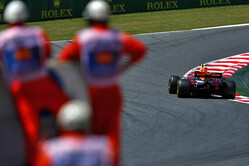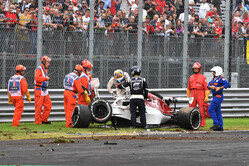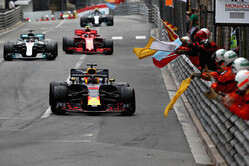


26/04/2020
NEWS STORY
 Almost from the moment organisers finally pulled the plug on the Melbourne event, F1's powers that be have been looking at how best to get the 2020 season back on track.
Almost from the moment organisers finally pulled the plug on the Melbourne event, F1's powers that be have been looking at how best to get the 2020 season back on track.
To date, two races have been cancelled while a further seven have been postponed and at least two more placed in serious doubt as current restrictions on public events are extended.
Though the rules allow for a championship comprising as few as 8 races, the sport is targeting as many as 19.
With the original schedule torn up, in order to accommodate that amount of races F1 is looking at a number of proposals, not least back-to-back events at the same circuit.
Indeed, it is understood that the sport may well kick-off with a double header at the Red Bull Ring, which would see the first race held on 5 July, as originally planned, and a second race a week later. Silverstone then would host its own double-header, most likely later that same month or early August.
The move comes at a time when the UK government is finally looking to impose a two-week quarantine on all arrivals at British ports and airports, following the successful example of Singapore.
Despite the easing of restrictions in some countries, the opening events are almost certain to take place behind closed doors, and with that in mind F1 is already making moves to ensure that promoters don't lose out financially.
While Red Bull - which has made no secret of its desire to host the season opener - owns the Spielberg track on which the Austrian races would be held, and can afford the financial impact of a race without spectators, Silverstone, which relies entirely on ticket sales for its revenue will need to be compensated by F1.
Following weeks of headlines speculating when the season might begin and how many events it might comprise, it would appear that we are finally seeing light at the end of the tunnel.
 Chase Carey, Ross Brawn and Jean Todt are raring to go, so too the teams and the drivers, while fans and the media are chomping at the bit... the virtual version only going so far in compensating for the lack of the real thing.
Chase Carey, Ross Brawn and Jean Todt are raring to go, so too the teams and the drivers, while fans and the media are chomping at the bit... the virtual version only going so far in compensating for the lack of the real thing.
But in all the speculation over when we might finally see the 2020 season burst into life and whether there will be 8 or 18 races, there has been no mention of a group of individuals without whom there cannot be any racing.
Marshals are recognised as the backbone, not only of F1 but of motorsport worldwide. These are the people who wave the flags, attend the incidents, drive the rescue units, marshal all areas of the circuit from paddock, to pitlane, to track to spectator areas, and much, much more.
Furthermore, they are volunteers.
A multi-billion dollar sport relies on volunteers, who not only give their time, but pay their own way in terms of travel, accommodation and even equipment. Indeed, over the years, some have paid the ultimate price for F1, the most recent example being the 2013 Canadian Grand Prix.
They do it because they love the sport, and want to give something back.
Despite their invaluable contribution to the sport however, these are ordinary (but devoted) men and women, who, like the rest of us, don't yet know what the state of play is going to be when this wretched pandemic is finally given the red flag.
We recently received an email from a marshal, who, though welcoming the impending return to work, warned that the sport cannot take his services as a given.
"In these troubled times it is commendable that there exists a determination to get the season under way as soon as possible," he wrote. The holding of Grand Prix behind closed doors is a great initiative, however the supply and safety of the hundreds of unpaid volunteers marshals and officials usually required for these events ought not to be taken as a given.
"These unpaid volunteers pay their own travel costs, accommodation expenses, finance their own personal equipment, and pay for their own catering for the duration of the event," he continued. "Following Covid-19 some will be out of work, some struggling to pay their bills and mortgages following furlough or plain simply not want to participate being fearful of catching the disease.
"Also by the very nature of their track duties team work is required and sufficient personal safety equipment is an additional requirement should this plan go ahead.
"I have seen no mention of the provision of volunteer officials or proposals for their welfare for 'closed doors' events and when push comes to shove circuit organisation and safety may be severely compromised through lack of marshalling numbers. This must be considered as an essential part of the overall planning."
 With this in mind, we approached the British Motorsports Marshals Club, where communications officer, Dave Smithson agreed that getting the season back underway may not be as simple as waving a flag.
With this in mind, we approached the British Motorsports Marshals Club, where communications officer, Dave Smithson agreed that getting the season back underway may not be as simple as waving a flag.
"Many are self-employed or run their own businesses," he said, "how soon they can return to normal activity and have time off work... and people who go back to work, who have maybe been furloughed, what will their new work regime look like? Will they need to work different hours or weekend work in order to get things up and running again? Their work might not allow them the freedom they previously enjoyed.
"There are a lot of factors to be considered," he admits, "not least the availability of marshals.
"We are not in direct discussion with F1, that is channelled through the governing body, Motorsport UK, who organise F1 in the UK, and they will be discussing the situation directly with both F1 and the government. They will be coordinating everything on our behalf.
"They are keeping us abreast of things, there are some discussions going on in terms of maximum/minimum numbers."
With 2,500 members, it's understood that around 80% are eligible to work at F1 events.
"One of the things we've been trying to address in recent years is the rise in the average age of marshals," says Smithson, "the average age is possibly in the high-50s, so a significant number could be self-isolating due to health or age potentially."
With an eye on the fact that a certain degree of social distancing might still be required, he admits: "While people could maintain the gap, this could all change in the event of an incident. Multiple people would be involved if a car went off and a driver needed help. Some roles in the pitlane, could also be difficult. Ambulances and fire trucks also have a number of crew... so there are going to be some challenges."
Asked roughly how many marshals would be needed were a race to take place next weekend, he says: "Roughly a thousand... there was a graphic on social media last year concerning the number of volunteers need for the Grand Prix and I think it was around 981. The track marshals, spectator marshals, fire crews... when they added it all up it was just under a thousand people."
As witnessed in Australia, Sebastian Vettel, Kimi Raikkonen and Lewis Hamilton made their call on the event long before F1's bosses did, and while it is taken as a given that the drivers are raring to go, most have young families and may not be prepared to take risks until the virus is given the all-clear.
"Absolutely," says Smithson, in terms of marshals, "there will be people who say 'I'm not taking that risk'. It might be their family units or elderly relatives they're cohabiting with, they won't want to put them at risk."
However, he quickly adds that. "The volunteer roles are always over-subscribed. For instance, my wife did last year's British Grand Prix but didn't get selected this year. If they suddenly find 50 - 100 people dropping out, they'd probably send out an email to those that weren't needed this year to reapply.
"There will be people ready and willing to step in at the last minute," he continues, "we do that because it's the nature of the beast.
"And we're not just talking about volunteering in this country," he adds, "we do it all over the world. There are friends of mine who were in Australia when it got called off, who had to fly home the next day. They went out there, for the trip of a lifetime, and all of a sudden they're not needed.
"They did Day 1, on the Thursday, the V8s and Supercars, they turned up on Friday morning, hung around for an hour or two only to be told 'go home'. There's no compensation, no refunds.
"There's a group of us from Oulton Park who regularly go to Canada. Some of them were planning to go this year but have now cancelled their trip.
"We had a poll on Facebook a while back as to 'do you think there should be some degree of payment or should it remain voluntary'. There's a real understanding that we do spend a lot of money sometimes, especially when it comes to F1, it comes out of our own pockets, there's no funding whatsoever.
"That's fine," he adds, "because if it were paid you would probably attract a different type of mind-set. We do it because we love it, and that's the way it should be."
At a time, Liberty Media has pumped $1.4bn into the sport to ease it through the bad times ahead, when we ask if marshals are being taken for granted, Smithson is keen to dismiss the idea.
"You've got to be careful that that isn't the perception that's created," he says, "because all the goodwill that we give could end, that's for certain, so we do need to be mindful of that.
"If, due to the circumstances this year, volunteers are needed twice, maybe for back-to-back events, maybe they should be looking at covering some of our overheads. This year's an unusual case, but maybe some consideration, some recognition should be given, otherwise that goodwill will soon dissipate."
We point out that F1 and the teams are not pushing to get the season underway for altruistic reasons but because of the huge sums of money involved.
"The organisers, the governing body, F1 need to be cognisant of the fact that their sport, their business relies on a huge army of volunteers to ensure the events are run safely and smoothly," he says. "They need to be mindful of that, and recognise that that level of goodwill, of all those people turning up, free of charge, year-in year-out will quickly dissipate if people are being asked to do two or three times in one season more than they would normally be asked."
Asked about the possibility of marshals attending the back to back races in Austria, he says: "There will always be a good number of British marshals willing to help out, if they're in a position to do so. If their personal circumstances allow them to and their personal finances allow them to.
"Of course, under the current circumstances it is likely they'll be asking what the bare minimum we can run with," he adds. "It's a difficult one, but they might say 'if we normally need ten marshals on that corner', and they find they can get away with less, will they ever need ten again. That's all well and good until there's a major incident.
"In the last couple of years there's been more reliance on technology, most notably in terms of blue-flagging on race day, which is now done by race control."
Another factor worth considering is that should it be announced that a race will take place at Silverstone - or anywhere else - behind closed doors, that does not ensure that people will be prepared to watch from the comfort of their sofas.
Asked about the ongoing ban of football last week, Scotland's First Minister, Nicola Sturgeon said that even if matches were played behind closed doors there is every likelihood that fans would either congregate outside the ground or in pubs to watch.
Unable to gain access to a race, there is no guarantee that fans wouldn't congregate outside circuits to catch a glimpse of their heroes or try to sneak in and watch the action live.
The threat, at a circuit like Silverstone, would require an increased security presence.
"Yes, this could give rise to a number of concerns," admits Smithson, "extra logistic challenges.
"Some people will, by hook or by crook, try to finds a way to get in to watch these events," he adds. "After four weeks of lockdown the good weather is seeing more people out and about, and if people see any slight relaxation of the rules, and return to normality, events, like F1, behind closed doors are going to be tempting. So that is a concern.
"Indeed, a lot of marshals are climbing the walls and can't wait to be back out there. So there will be others, it will be a challenge."
Going back to that original email, the fact is that we do tend to take these people for granted, rarely giving a thought to their invaluable contribution to our sport.
While we all want to see Lewis and the gang back on track as soon as possible, we must ensure that the sport does not take Dave and his colleagues for granted.
They have been hit by the pandemic and its economic fall-out like the rest of us, and we cannot expect them to be there on call especially if there is any likelihood of a repeat of the shambles that was Melbourne.